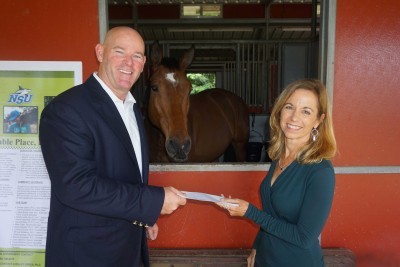NSU Newsroom
SharkBytes
Horizons
This version of NSU News has been archived as of February 28, 2019. To search through archived articles, visit nova.edu/search. To access the new version of NSU News, visit news.nova.edu.
This version of SharkBytes has been archived as of February 28, 2019. To search through archived articles, visit nova.edu/search. To access the new version of SharkBytes, visit sharkbytes.nova.edu.
NSU’s Equine Therapy Program Receives Boost from Quell Foundation
When it comes to mental health issues, it’s personal for Kevin Lynch.
The U.S. Navy Veteran, who has a son diagnosed with bipolar disorder, has battled his own bout with depression. Today he leads an army of volunteers who want to shift how society views and treats people with mental health issues. He created the Quell Foundation to educate communities about mental health issues and promote open, judgment-free dialogue. And when he heard about Nova Southeastern University’s (NSU) equine-assisted family therapy program (EAFT), he knew he had to get involved.
NSU professor Shelley Green, Ph.D. invited Lynch to experience the program firsthand at Stable Place, the program’s community partner, located in Davie. While this type of therapy does involve horses, Lynch found out that it doesn’t include mounting a horse. Instead, Green uses sessions with a horse to explore family dynamics.
“EAFT requires no horse experience, and most clients arrive with no horse knowledge at all,” Green says. “Horses pick up on the subtleties of human behavior. They respond to their environment and activity around them, and our therapists can use the horses’ reactions to facilitate clients’ growth and change.”
At the end of Lynch’s visit, he presented a $50,000 ceremonial check to commemorate the Quell Foundation’s five-year pledge to fund scholarships for NSU students. Green said the scholarships will increase the number of students who can learn this new form of therapy.
“It’s all about bringing people into the mental health field,” Green added. “These scholarships will encourage people who might not otherwise be able to afford the advanced EAFT course.”
NSU’s EAFT model is the first of its kind to be offered by a nationally accredited family therapy program. Part of the reason the model works so well is that a number of experts are involved in the process. Students have the unique opportunity to work with clients, but with the aid of a licensed mental health professional as well as an equine specialist. Student therapists create opportunities for client-horse interaction that are relevant to the clients’ day-to-day situations and challenges. The stable as a therapeutic environment provides distinct advantages. Engaging the clients with the horses allows the therapist to directly observe family interactions as they occur, rather than discussing past issues and concerns. This can make it easier for the student therapist and client to discuss feelings, behaviors, and observations sparked by the session, and allow the clients to experiment with change in the moment.
“The idea of practicing therapy beyond the four walls of an office drew me to the innovative and experiential nature of equine-assisted family therapy,” said Michael Rolleston, doctoral intern. “EAFT can open a metaphoric conversation that connects what is happening in the session to clients’ everyday lives. The added benefit of working outdoors allows them to reflect on their process in the moment.”
Fellow doctoral intern Monica Schroeder adds, “Horses are like a mirror; who you are in life is who you will be with the horses, and they will reflect this back to you. They challenge people to face fears, assumptions, and struggles all while highlighting strengths, intentions, and successes. You get a chance to try and practice your skills, finding what works, and what could be changed.”
Amy Sperling, the owner of a 15-acre ranch in Davie, Florida provides use of her stable, paddocks and horses for the program. Stable Place Executive Director Valerie Judd collaborates with Green to train staff and help deliver meaningful experiences to the families seeking help.
“A mental health illness is not relegated to the people in the streets, or in hospitals, or in prisons,” Lynch adds. “This is an underserved population that needs help. We want to help the entire population and lift the mask on mental health to remove the stigma.”
